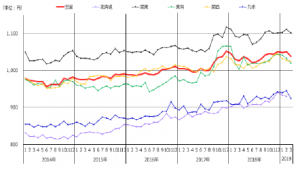On April 11, Human resource services company Persol Career published data on average hourly part-time wages. This data was analyzed and calculated as of March 2019 from the job advertisements posted on an, a job listing media operated by Persol Career.

According to this data, the average hourly wage nationwide is 1,039 yen, a reduction of 12 yen compared to the 1,051-yen average of the last month and an increase of 12 yen compared to the 1,027-yen average of the same month last year. The number of job openings remains almost unchanged at 99.7% as compared to last month, and 144.9% on a year-on-year basis due to the high recruitment needs.
Subsequently, results of the average hourly wages by area were also released. The Kanto area had the highest average at 1,102 yen, followed by the Kansai area with 1,025 yen. The Tokai area came in third place with 1,020 yen, with the Hokkaido area at 935 yen and the Kyushu area with an average of 925 yen.
The increased recruitment needs in the Kyushu area have now subsided with the urban development of Hakata and the Tenjin area leading to a decrease in the average hourly wage. As for the Tokai area, the number of job openings in the food industry and sales departments has increased with the opening of new shopping malls near the suburbs of Nagoya’s Minato ward and Toyokawa city. Particularly, the average hourly wage for the food industry has reached the same level as Sakae or the urban areas around Nagoya station.
In terms of types of jobs, the average hourly wage was highest for skilled profession jobs at 1,301 yen, followed by 1,152 yen for transport jobs, 1,080 yen for office jobs, 1,058 yen for service jobs, 1,049 yen for skilled/ labor jobs, 998 yen for food jobs, and 948 yen for sales jobs.
To improve the retention rate of nursing care and welfare jobs, and to increase the wages of nursing care workers who have been working for a long time, it has been decided to revise the Nursing care insurance system by October 2019 to increase the wages for long-time nursing care sector workers. With this revision, it is expected that the people in the nursing care and welfare sector will less likely change careers. In order to secure human resources, there’s been an increase in job postings for nursing care and welfare positions being classified under “skilled profession” jobs.

According to an chief editor Mr. Kawai Keita, the national average hourly wages for March decreased compared to the past due to in-house shuffling during the graduation season and an increase in demand of regular part-time workers in the food industry and sales departments. Due to an increase in people moving house, job openings in the transport industry and the average hourly wage went up. With the first ever 10-consecutive-holiday Golden Week, there has also been an increase in job openings in service industry field work at places like hotels, shops and restaurants. Looking at the April prospects, the average hourly wage nationwide is expected to go up relatively with an increase in short-term job openings, particularly in the food industry, during the Golden Week holidays, and hence the average hourly wage would show a marginal change or slight reduction.



















